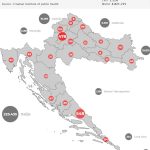
Last updated on March 2, 2021 – As Croatia announces another major change to the rules regulating entry to Croatia, we will continue to monitor the situation and include as much of the confirmed information in our FAQ. However, it’s important to keep in mind that this article has not been fully updated with all of the currently relevant information.
The situation continues to change rapidly, but the questions and the confusion remain. In this article, we will try to provide clear answers to some of the most common questions asked in our Total Croatia Travel INFO Viber community.
One other major resource for additional information regarding travel to Croatia in 2021 is our main TCN Croatia Travel Update, updated with the most relevant information daily.
If you have any relevant information or experiences which can add to this resource or the TCN Croatia Travel Update, then please email paul@total-croatia-news.com Subject Update
1. Can I enter Croatia and do I need a test?
The answer to both those questions is “most probably”.
You are allowed to enter Croatia if you’re a citizen of the EU/EEA (EU 27 + Iceland, Lichtenstein, Norway, Switzerland, as well as Andorra, Monaco, San Marino, and the Vatican) or a non-EU citizen with an EU residence permit (or a member of their family, with documents to prove the kinship), no matter where you’re arriving in Croatia from.
If you’re arriving from the ECDC “Green list” region, and you can prove that you haven’t stopped anywhere between that Green list region and Croatia and you show no symptoms of the disease and have not been in a close contact with an infected person you don’t need a test. If you’re arriving from a country listed on the so-called EU Safe List (as of October 22, 2020, the list includes Australia, Japan, New Zealand, Rwanda, Singapore, South Korea, Thailand, Uruguay, and China + Hong Kong and Macao), and you can prove that you haven’t stopped anywhere between that Green list region and Croatia and you show no symptoms of the disease and have not been in a close contact with an infected person you don’t need a test.
Everyone else (there is a list of exceptions, which mostly includes those in transit, leaving Croatia within 12 hours, persons traveling for necessary family or business reasons and patients traveling for urgent health reasons) needs to present a negative PCR test, not older than 48 hours (from the time of sampling until the time at the border crossing), or get tested immediately upon arrival in Croatia (at the travelers expense), and self-isolate until they receive a negative test result (up to 10 days).
Third-country nationals (non-EU, including the UK) will be allowed to enter Croatia under the same rules if they’re arriving from the EU/EEA region, but need to show the reason for entering Croatia if they’re arriving from a third-country. Seafearers and persons travelling for urgent personal/family reasons and business reasons or other economic interest will be allowed to enter if they present a negative PCR test, not older than 48 hours (from the time of sampling until the time at the border crossing), or get tested immediately upon arrival in Croatia (at the travelers expense), and self-isolate until they receive a negative test result (the self-isolation measure is issued for the period of 10 days). Passengers in transit from the third-countries will not be required to show a negative test result.
On December 14th, it was publicly announced on the Croatian police website that the travellers who can prove with the medical documentation that they’ve had COVID-19 in the last three months are allowed to enter Croatia without having to take a PCR test or self-isolate.
PLEASE CONSULT OUR ARTICLE WRITTEN ON NOVEMBER 30 FOR MORE DETAILS.
For more details read the comprehensive Total Croatia Travel update.
2. Does it have to be a PCR test?
Yes.
There is no age exemption from testing by Croatian authorities, all kids have to have a negative test. Croatian Border Police will accept your results via e-mail too, not just hardcopy. They’ll provide the exact e-mail address for you to use at a border crossing. They’ll insist on hardcopy if the test is from Serbia or Bosnia and Herzegovina because of many forgeries.
For more information on where to get PCR tested internationally before coming to Croatia, please read our article.
3. What if I cannot get the test in time before I leave?
If you arrive at the Croatian borders without a negative test, you will be given an official self-isolation measure, for the next 10 days. You can either go straight to your place of stay in Croatia and wait the 10 days out while self-isolating, or you can take the PCR test for SARS-CoV-2, at your own expense, in Croatia.
As of December 10th, 2020, once you have the negative result, you will have to send the results to the Croatian Border Police station which issued your self-isolation order (not to the epidemiologist in charge, as was the case before this most recent change). The border police will then remove you from the self-isolation list, and you are free to travel.
4. Where can I get tested in Croatia?
https://www.total-croatia-news.com/lifestyle/44737-get-tested-covid-croatia
>For any additional info regarding testing in Croatia, you can find the list of contact numbers on official koronavirus.hr website.
5. Is a Domovnica enough to allow me to enter Croatia without a test?
As of December 1st, there are no exceptions for Croatian citizens regarding the rules of entry into Croatia – the rules for the Croatian citizens are exactly the same as they are for any other EU citizens. So, having Croatian documents won’t allow you to enter without a test. It might help if you’re a third-country citizen (in addition to having Croatian domovnica), so have it handy if possible).
Domovnica is proof of your Croatian citizenship, so you can enter Croatia unconditionally any time, but it is in Croatian and it is not a travel document. We have had several success stories with this. One thing that seems to work is a confirmation letter of your Croatianness from your embassy or consulate, in English to corroborate the Croatian text of the document.
6. Who needs to show proof of booked accommodation?
Rules applied as of December 1st don’t mention anything about booked/paid accomodation. Answers 6&7 will get updated when more information becomes available.
All arrivals who are not EU/EEA/UK or non-EU citizens with EU residence permits. Important note: if one member of the family is EU/EEA/UK or non-EU citizens with EU residence permits the entire family is allowed to enter, no matter what passports others have. It is crucial you’re able to prove legal status, by showing a marriage certificate and other supporting documents for family members.
7. If proof of booking acceptable, or does it have to be proof of paid accommodation?
In most cases, proof of book is acceptable, but the official wording is proof of paid accommodation. To be on the safe side, book, and pay for at least one night.
8. Who needs to fill in the entercroatia.mup.hr form?
Filling in the form is NOT mandatory, but it is recommended to all non-Croatian residents. Its purpose is to process the border as quickly as possible and to enable the authorities to contact you in case of an outbreak, Special Enter Croatia lanes have been introduced at some borders. The average processing time if you have filled the form is 30 seconds, and about 5 minutes if not. Many in the community comment on the lack of documentation checks when they arrive in Croatia. This is because the police can see all the information when they scan your passport or ID you entered on enterCroatia.mup.hr. Learn more about the form.
If several family members are traveling together, you should create just one form for all of them. One person should submit the form, while the rest of the family should be added under “additional passengers”.
9. We plan to stay in Croatia in different locations, changing addresses. Do we need to edit the form? What if our plans change while we’re there?
It is critical you enter your first location correctly, and your estimated time of arrival and departure (not longer than 90 days from entry). Once you’re in Croatia, there is no need to update dates and/or locations if something changes, or you just move around Croatia. That is also true if you decide to stay longer than you estimated when you originally filled out the form – there are other systems in place, and you don’t need to worry about your entercroatia.mup.hr form.
10. Can I self-isolate at my accommodation? What are the rules of self-isolation and how are they enforced?
Yes, but if you are given an official self-isolation measure by the epidemiologist or border police, you have to provide proof of paid accommodation for the duration of the period, because you have to stay in one place for the entire self-isolation time. Official self-isolation epidemiological measures advise that you stay in your accommodation ALONE or in a separate room with separate toilet, to isolate you from the others, since you are presumed to potentially carry the virus. So you are not supposed to leave your premises at all (except for the testing purposes, but strictly only if wearing a mask) – food and other necessities have to be delivered to you, without contacts. It also means police will check from time to time are you self-isolated at the address you gave them; if they don’t find you there, they can fine you (around 1000€).
11. Can I transit flying from the USA and other countries outside the EU through a Schengen country?
Yes, but you must have a ticket for a connecting flight to the final destination in Croatia in order to transit Frankfurt or Amsterdam for example. When possible, you should have a printed ticket for your connection to facilitate transit. If you do not have an onward ticket to a connecting flight, German federal police will not let you enter the country. You will not be permitted to leave the transit area of the Frankfurt airport, no matter how long your layover may be. It is also important to make sure your bags are checked all the way through the final destination at the starting airport. If not you have to have some notify them to get your bags for you ahead of time at the connecting airport as you can not do that yourself.
We now have confirmation from our community that it’s possible to transfer through the Frankfurt, Copenhagen, Zürich, London, Warsaw, Amsterdam, and Istanbul airports on your way to Croatia. At Amsterdam and Istanbul airports you can also get a PCR test done, while in transit. Transfer through CDG Paris is also possible, but as of July 27 they are requesting a COVID-negative test, not older than 72 hours, even for transit passengers (click here for more information in English). Find out more about the conditions at the Warsaw Airport by clicking on this link.
12. Which documents do I need to present when traveling from any third-country (including the USA and Canada) to various officials, from the boarding agents at different airports to the Croatian Border Police – how do I do my homework right before traveling to Croatia?
Well, you really should come prepared – with both the paperwork and patience! From what we’ve been able to gather from our Total Croatia Travel INFO Viber community, your biggest obstacle might be to convince the boarding agents in your home country that you are, in fact, allowed to enter Croatia. Having a printout of the IATA guidelines will certainly help, as will the confirmation of paid reservation in Croatia. If you have Croatian citizenship, make sure you have proof of that at hand as well (domovnica or any other similar document), especially if you’re traveling without valid Croatian passports. If only some members of the family are Croatian or EU/EAA, bring with you the marriage certificates and/or other documents proving relationships with other members of the family, to make things easier for them. If you’ve decided to announce your arrival through http://entercroatia.mup.hr form, make sure you have a printout of their confirmation mail. If you contacted bit.ly/CroatiaTravel or uzg.covid@mup.hr, the printouts of their response might help as well. Of course, if you’ve gotten tested, have the results or any type of confirmation that you’ve taken the test handy as well.
The members of our Viber community shared with us that the e-mail address for the police at Frankfurt airport is bpold.frankfurt.sb11@polizei.bund.de, and that they’re very responsive and helpful – so if you need some help in Frankfurt, you should probably write to them.
Good luck! And let us know how it went in our Viber Total Croatia Travel Info group!
13. There are PCR testing facilities at Schengen airports. Can I do my test there?
If you are already in the EU and flying from those airports, YES you can. But, if you are in transit from an international flight and not allowed to enter Schengen countries (pls check Re-open Europe to see if you are allowed to enter) then NO. Make sure you check all these details with the airport and facility. Let us know if it works!
For example, US citizens are not allowed to enter Schengen for time being, but Canadians might be – so the US citizens can not test in transit, but Canadians just might be able to do so!
We can now confirm that the US citizens can get tested at Amsterdam airport, as well as at Istanbul airport.
14. Can I enter an airport and get a hotel in a Schengen-zone airport if I have a long stopover?
If you are not permitted to enter the Schengen area, then NO. Check details for every EU member country on REOPEN EUROPA site https://reopen.europa.eu/en. For overnight layovers, there is one hotel in the transit zone in Frankfurt, for example, the My Cloud (+49-69-69030380, https://www.mycloud.de/en/home/ ).
15. Can I stay in Croatia for 14 days and then move on to some EU Schengen country?
Schengen is closed to US citizens, but open for citizens of 9 countries right now (Australia, Japan, New Zealand, Rwanda, Singapore, South Korea, Thailand, Uruguay, China + Hong Kong and Macao). The situation is, again, changing very rapidly, and rules everywhere are getting stricter, so before travelling make sure you check the details for the country you are interested in on the REOPEN EUROPA site https://reopen.europa.eu/en. Germany has placed several Croatian counties on their high-risk list, which means that all travellers arriving from those counties need to either self-isolate or get tested. The German authorities seem to be very responsive (especially Franfurt airport border police: bpold.frankfurt.sb11@polizei.bund.de) – this is the feedback from our Viber community so join and see others’ experiences. Click here for more info about the conditions for entering the EU countries, as well as the links to their official websites. Austria has placed Croatia on their “high-risk” list, meaning that, in order to enter Austria, you must have a negative PCR test (not older than 72 hours), or self-isolate until you’re able to get tested there, within 48 hours of arrival.
16. What is the epidemiological situation in Croatia?
Obviously, it’s very fluid. In our TCN Croatia Travel Update, we bring you the latest numbers as they get reported every day. You can follow the situation on the official koronavirus.hr website, as well as on the CroatiaCovid19.info tracker, where you can see the cases by region. To compare the Croatian situation with what’s going on in Europe at any given time, please follow the ECDC COVID-19 situation update.
If you have any relevant information or experiences which can add to this resource or our main TCN Croatia Travel Update, please email paul@total-croatia-news.com, Subject: Update
For the latest travel info, bookmark our main travel info article, which is updated daily.
Read the Croatian Travel Update in your language – now available in 24 languages
Join the Total Croatia Travel INFO Viber community.










